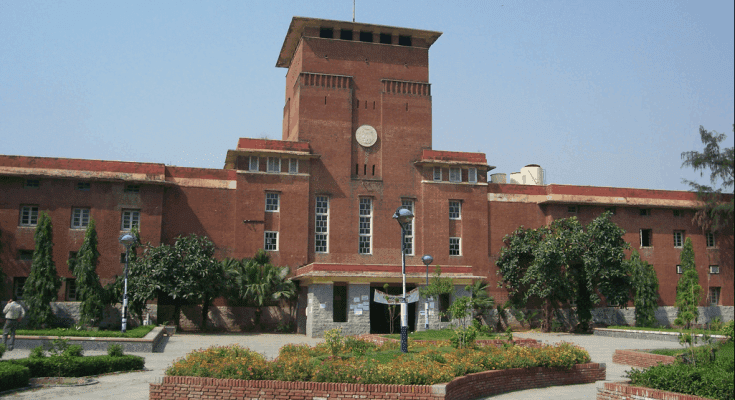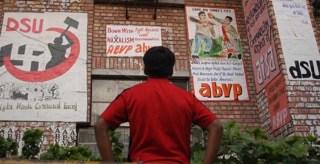With the attention being drawn to the public protests, a lot is being said and done inside the IPCW campus. Following these protests on the 28th and 29th of March, the IPCW administration along with the members of the student body held a closed-door meeting in the IQAC room of the college. Read along as DU Beat investigates the contents of this meeting and the spat between the IPCW administration and its Student Body through the verbatim of one of their students.
On 28th March, Monday, IPCW college’s fest was invaded by unidentified men leading to chaos. On 29th March, Tuesday, IPCW college saw protests including students and members from the Students’ Federation of India (SFI) and the All India Students Association (AISA). These protests were met with heavy police deployment and detainment – something that was missing on the day students were clamouring to get away from the men harassing them.
On Friday, March 31, following the events on the 28th and 29th, and the brutal detainment of students by Delhi Police, the agitated students of Indraprastha College for Women raised the twin demands of a public apology and a resignation letter from the principal, Poonam Kumria.
Amidst these protests, a student of IPCW, who wishes to remain anonymous, told DU Beat all about the spat between the student body and the college administration. They said, “because it was a holiday, on the 30th, occasion of Ram Navami, there was a meeting in the IQAC room of the college with the committee comprising professors, the principal, and the student’s union.” Within the closed doors, the Principal claimed that it was no one’s fault. However, based on her alleged political affiliations and saffron strokes on the logos and decorations, along with inviting Navika Kumar for the inaugural ceremony, her position was questionable.
“After reviewing the CCTV footage, it seemed as if the mob had been planted.” According to the source, there were three signs: first, a particular man raised his camera before the stampede began, which implied he knew it was going to happen. Second, a day before the fest, on the 27th, there was a group of men from a political party who were not allowed to enter because they didn’t register, and their reply was “dekh lunga tumhe kal” (I will see to you tomorrow). Third, someone had done something to the camera because it blacked out. “There was a particular point where we wanted to see what had happened and someone had, I don’t know, hit the camera, and there was a major lapse because of it”, said the IPCW student.
“The moment you try to speak to her about what happened on the night, down on the morning of the 28th, she gets a little hyper-aggressive. And we didn’t want to do that to her. Because you understand we are a group of 19-20-year-old women sitting among you know, 40-50-year-old people.” The meeting continued, and after a while, the union along with the principal exited the room to issue a statement.
Now the principal gave a statement that was very contradictory to what was discussed in the room. She was like, in spite of the stampede, it was the Student Union’s decision to go forward with the fest. Even on the day of the first protest, she said it was the student union’s mismanagement that the stampede occurred. In the meeting, when it was happening behind closed doors, she blamed it on the Delhi Police. And outside, because she knows people are recording it, she blamed it on the Student’s Union. She knows if she blames it on the Delhi Police outside, it will backfire on her.”
The principal claimed that she had written letters to the police, the ambulance, and the fire brigade to provide security. However, an IPS officer while answering the students amidst the protest, revealed that they had never received any such letters from the college demanding security.

Authorities denied receiving letters from the college demanding security.
By evening, there was a lot of movement of the police, both inside and outside the campus since Section 144 was imposed right outside the campus. The principal refused to come out of the room because of all the sloganeering. Soon enough, “the principal comes out of the room with a force of about 40-50 police officers assuring her safety. There were water tankers and barricades outside to ensure her exit. Not a single police officer was present on the 28th, but for this single individual, there was such a big force.”
The students, around 500 to 800 in number, had now formed a human chain right outside the main gate to prevent the principal from exiting the premises and to hold her accountable for everything that had transpired over the past few days. Between the blame game, and the police helping the principal to escape, “another stampede occurred…the two girls right in front of me fell and got injured. Naturally, the police also fell. Now to clear the way, some of these officers knocked some of the girls in the rib with their elbows, and others kicked the girls to get them out of the way. The Delhi Police, just a while ago in the college had remarked, “You can be safe with us, we’ll protect you…”” revealed the source.

A human chain formed in an attempt to stop the principal from leaving.
The principal sanctioned a 10-day leave for the entire Student’s Union right after they demanded she release an official statement on the account of the student body pressuring the union. “The union asked her to do this and to this she replies- It’s okay, tum log underground chale jaao aur 10 din ka leave lelo (you people go underground and take a leave of 10 days), I’ll handle everything…We felt she was doing this because the moment we left for our homes, she could put the entire blame on the union” stated the IPCW student. “They kept saying kuch nahi hua hai kuch nahi hua (nothing has happened) to console us. It all happened at the gates of IP college, which is ALSO a part of it…how can they say kuch nahi hua hai?”
Upon being asked to comment and elaborate on the saffron hues that one can find IPCW’s walls painted in, the student continued, “The walls are being painted by the MCD, they want to paint the history, flora, and fauna of IP on these walls. Inside the campus though, there are logos and everything that she (the principal) has saffronised, and I don’t know why has she done that. There was a logo-making competition a few months ago, and I remember no one submitted this particular logo that ended up being used. And when everything got into the news, she changed the logo back to the older one, and never even informed the Union to switch to the older logo taaki voh fass jaayein (so that they get trapped)…”
The issue is why are we being recorded all the time? Every time there is a protest, we are being recorded by the staff, and there are even drones present. She can spend on an entire drone when the stampede is going on or when she’s being rescued from the college, but she could not apply for security which is free of cost when it comes from Delhi Police. Why?”
AISA, SFI, etc… we don’t wanna be a part of all this. We want to be a part of it as IPCW students and protest that way. AISA becomes a part of everything. Going inside the campus is a bigger fight. Imagine principal ke aankhon ke saamne unke students jinko voh family bolti hain crush hue hain amidst the stampede (Imagine the students she calls family were crushed in front of her eyes in the stampede), and she didn’t even look back to see…”
With the IPCW administration still choosing to stay silent on the matter, this student elaborated furthermore, “The Administrative Officer, Mr. Dinesh Sundriyal. He laughed off everything. There was a stampede going on, and we could see him far off, the man who denied us security, he was standing there talking, making conversations, and laughing. (On Friday), we got very angry and when we tried calling him out, he just laughed it out again. I don’t know…men being entitled all the time, they don’t take us seriously.”

Students continue to fight to reclaim their safe spaces and seek accountability from the authorities.
Poonam Kumria, the principal of IPCW has essentially passed the entire blame on the Delhi police and the Student’s Union despite both entities claiming that they were never asked to provide security or take a decision regarding the continuity of the fest, respectively. What Delhi Police has been active in, is dragging peaceful protesters into buses, kicking away students and indulging in other acts of police brutality. Measures are being taken, but the direction remains unclear, and with accountability still not finding its place in the matter, IPCW students continue to fight the administration.
Read Also: Delhi Police Detains Student Protestors at IPCW.
Image Credits: Anshika for DU Beat, @manya3gaur (Instagram Handle)










